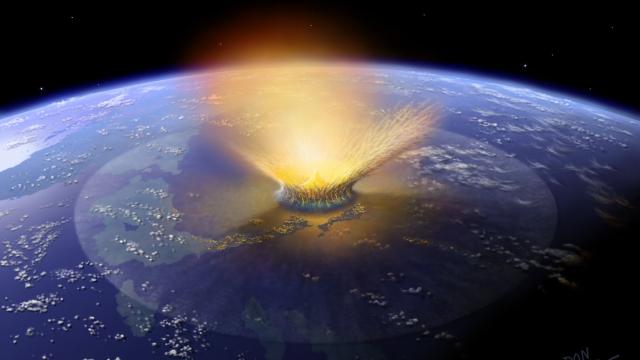In December 2021, a team of paleontologists published data suggesting that the asteroid impact that ended the reign of dinosaurs could be pinned down to a season — springtime, 66 million years ago — thanks to an analysis of fossilized fish remains at a famous site in North Dakota.
Now, a different group of researchers is accusing the former group of faking their data; the journal that published the research has added an editor’s note to the paper saying the data is under review.
The situation was first reported by the publication Science last month. Melanie During, a paleontologist at Uppsala University in Sweden, submitted a paper for publication in the journal Nature in June 2021. The paper’s chief finding was that the large asteroid that slammed into Earth at the end of the Cretaceous struck in spring, a conclusion reached by studying fossilized fish found in North Dakota.
But two months before During’s paper would be published, a paper came out in Scientific Reports “reaching essentially the same conclusion, based on an entirely separate data set,” Science reported. The latter paper was published by a team led by Robert DePalma, During’s former collaborator and a paleontologist now at the University of Manchester.
Both papers made their conclusions based on analysis of fish remains at the Tanis fossil site in North Dakota. Tanis is a rich fossil site that contains a bevy of marine creatures that apparently died in the immediate fallout of the asteroid impact, or the KT extinction.
According to the Science article, During “suspects that DePalma, eager to claim credit for the finding, wanted to scoop her — and made up the data to stake his claim.”
DePalma made major headlines in March 2019, when a splashy New Yorker story revealed the Tanis site to the world. The media article was published several days before an accompanying research paper on the site came out in the Proceedings of the National Academy of Sciences. Gizmodo covered the research at the time. Tanis is on private land; DePalma holds the lease to the site and controls access to it.
“This is not a case of ‘he said, she said.’ This is also not a case of stealing someone’s ideas. This is misconduct,” During wrote in an email to Gizmodo.
Both papers studied 66-million-year-old paddlefish jawbones and sturgeon fin spines from Tanis. The fish contain isotope records and evidence of how the animals’ growth corresponded to the season (tree rings do the same thing). In turn, the fish remains revealed the season their lives ended — ergo, the precise timing of the devastating asteroid strike to the Yucatán Peninsula.
Last month, During published a comment on PubPeer alleging that the data in DePalma’s paper may be fabricated. In the comment, During, her co-author Dennis Voeten, and her supervisor Per Ahlberg highlight anomalies in the other team’s isotope analysis, a dearth of primary data, insufficiently described methods, and the fact that DePalma’s team didn’t specify the lab where the analyses were performed.
OK, some more info about the DePalma paper! A🧵
1) Number of specimens: the paper states that “a total of 7 fossil adult polyodontids and 12 acipenserids were selected for histological analysis”, so 19 specimens in all. One of our main concerns with the paper – explained in 1/
— Per Ahlberg (@PerAhlberg1) December 7, 2022
As detailed by Science, the isotopic data in DePalma’s paper was collected by archaeologist Curtis McKinney, who died in 2017. It’s not clear where McKinney conducted these analyses, and raw data was not included in the published paper.
“It feels like a case of ‘the dog ate my homework,’ and I don’t think the relatives of Curtis McKinney deserve this,” During told Gizmodo.
DePalma did not respond to a Gizmodo request for comment, but he told Science, “We absolutely would not, and have not ever, fabricated data and/or samples to fit this or another team’s results.”
On December 9, a note was added to DePalma’s paper on the Scientific Reports website. It reads: “Editor’s Note: Readers are alerted that the reliability of data presented in this manuscript is currently in question. Appropriate editorial action will be taken once this matter is resolved.”
The same day, Ahlberg tweeted that he and During submitted a complaint of potential research misconduct against DePalma and Phillip Manning, one of the paper’s co-authors, to the University of Manchester.
When asked for more information on the situation on January 3, a spokesperson for Scientific Reports said there were no updates.
More: Science Publisher Retracts 44 Papers for Being Utter Nonsense
